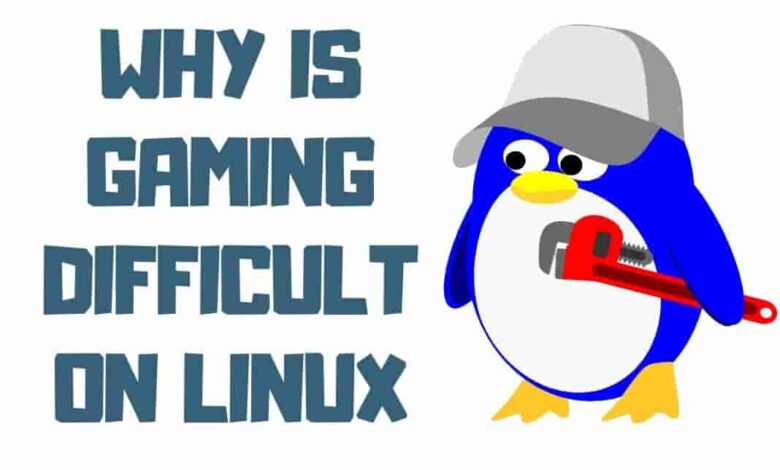Why Is Gaming Difficult on Linux: Challenges & Limitations

The challenges of gaming on Linux have been debated, with factors contributing to the difficulties compared to other platforms like Windows and macOS. This article aims to explain these factors, explaining Why Is Gaming Difficult on Linux.
Key takeaways:
- Linux’s popularity for gaming is increasing due to its reputation for stability, security, and customizable capabilities.
- However, gaming on Linux still faces challenges and limitations.
- Limited compatibility with proprietary software and suboptimal driver support can affect gaming performance and availability of games on Linux.
- The absence of native support for DirectX technology may pose a challenge for developers who want to transfer their games to Linux.
- Varied user experiences across different Linux distributions can make it more difficult for some users to get started with playing on Linux.
- Despite these challenges, the potential for future advancements and increased interest in Linux gaming is high, and continued efforts to improve compatibility, driver support, and user experience are essential.
Why is Gaming Difficult on Linux?

Linux’s popularity has increased, but it still faces challenges matching Windows’s large user base, particularly in the gaming industry. This can be attributed to various factors.
Smaller market share:
Due to the possibility of greater yields on investment, developers frequently focus their resources on operating systems with more significant user populations, such as Windows and macOS. However, the lower market share of Linux may deter game makers from creating or modifying titles for the system.
Lack of proprietary software support:
Linux predominantly runs on open source. As a result, proprietary game engines and third-party tools developed explicitly for Windows or macOS may need to be more Linux-compatible, leading to limited game availability.
Driver support:
Graphics card manufacturers primarily focus on Windows when developing and updating their drivers. Linux’s graphics drivers have made advancements but may still require improvement to match the performance and compatibility of other systems. This could potentially affect the speed and stability of gaming experiences.
DirectX compatibility:
Many game developers utilize Microsoft’s DirectX technology for advanced graphics and game programming. However, Linux’s absence of native DirectX support necessitates using open-source OpenGL and Vulkan APIs when porting games to the platform, which can pose an added difficulty.
Ease of use:
Linux is known for its various distributions, which can lead to differences in user experiences and installation procedures. This inconsistency could deter gamers and developers from adopting the platform, as it complicates learning how to game on Linux.
The Linux gaming landscape
Despite the challenges, the situation for gaming is gradually improving. Here are some crucial milestones:
- The launch of Valve’s SteamOS and efforts to port more games to Linux.
- The Proton compatibility layer, developed by Valve, supports Windows games on Linux, increasing the number of Linux-compatible games on Steam.
- The cross-platform Vulkan API’s increasing adoption offers better performance and compatibility across various platforms, including Linux.
Frequently Asked Questions
Why is Gaming on Linux Difficult Compared to other Platforms like Windows and macOS?
Gaming on Linux is challenging due to several factors. These include a smaller market share, lack of proprietary software support, suboptimal driver support, no native support for DirectX technology, and varied user experiences across different Linux distributions.
How Does Linux’s Smaller Market Share Affect Gaming?
Due to the smaller market share, game developers often focus their resources on platforms with larger user populations, like Windows and macOS. This can result in limited game availability on Linux.
Why is Driver Support a Challenge for Gaming on Linux?
Graphics card manufacturers primarily focus on Windows when developing and updating drivers. While Linux’s graphics drivers have improved, they may still need further enhancements to match the performance and compatibility of other systems.
What is the impact of the Lack of Native DirectX Support on Linux Gaming?
Many game developers use Microsoft’s DirectX technology for advanced graphics and game programming. Linux’s absence of native DirectX support means developers must use open-source OpenGL and Vulkan APIs when porting games to Linux, adding an extra layer of difficulty.
What are Some Advancements in Linux Gaming?
Some key advancements include the launch of Valve’s SteamOS, the Proton compatibility layer developed by Valve, and the increasing adoption of the cross-platform Vulkan API. These developments have increased the number of Linux-compatible games and improved performance and compatibility.
What is the Future of Gaming on Linux?
As technology progresses and more gamers switch to Linux, the challenges Linux gaming faces may be addressed. Game developers may be more incentivized to create Linux-compatible games, and the Linux community could continue to improve driver support and user experience.
Conclusion
Gaming on Linux can be challenging due to several factors. Linux faces a tough battle with its smaller market share than big players like Windows and macOS. This means game developers may not give it the attention it deserves, leaving Linux gamers feeling like the underdogs.
Additionally, limited compatibility with proprietary software and game engines, suboptimal driver support, and lack of native support for DirectX technology can all impact the availability and performance of games on Linux.
As technology progresses and more gamers switch to Linux, these problems may be addressed. Game developers may be more incentivized to create Linux-compatible games, and the Linux community could continue to improve driver support and user experience.
There have been notable advancements in Linux gaming, including the emergence of game streaming services that enable gamers to play Windows-only games on Linux.

